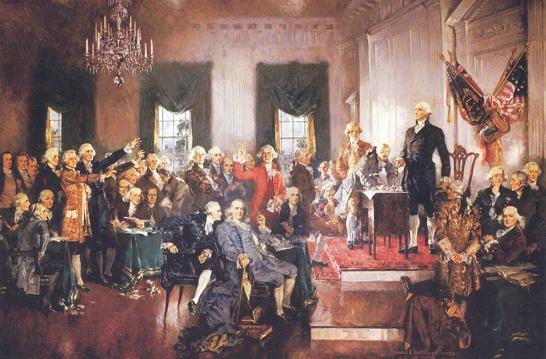
The Constitutional Convention, Philadelphia PA.
Strictly an Op-Ed…
On September 17, 1787, the United States Constitution was signed solidifying the newly formed American nation as a united republic. Each year on this date, Constitution Day is recognized as the national day of celebration commemorating the ratification of this vital document.
America’s political divide has sparked a renewed interest in the Constitution. I cannot think of any other time in which this charter has been more hotly debated by both sides of the political spectrum. Each party seems to have assumed proprietorship over the Constitution in order to support their own respective agendas. This biased exploitation has forced voters on both sides to reexamine the document in an attempt to not only interpret what the Founding Fathers may have intended, but also to determine how the document’s precepts fit in today’s modern society.
Some analysts and attorneys have stated that the Constitution has become antiquated and far too restrictive. To them, it prevents the country from achieving any substantial political growth. Others believe the document to be infallible and demand that it remain exactly as is. (The last addition to the Constitution occurred in 1992 when the Twenty-seventh Amendment prohibited any law that increased or decreased the salary of members of the Congress from taking effect until the start of the next set of terms of office for Representatives.)
As a document that both empowers and limits government, it is understandable that the Constitution is viewed differently. In one camp, constitutional experts believe that the charter begs updating as America has undergone radical changes over the last 200 years. This includes drastic expansion in the country’s culture, ethnicity, religious mixes, and technology. The United States is a much more diverse and tolerant society, whose status in the world has been drastically altered in recent years. One could also argue that the size and structure of the government has grown far beyond its constitutional framework and that the Founding Fathers could never have envisioned the global society that we live in today.
Others believe that the U.S. Constitution must remain untouched and preserved in order to maintain the sanctity of the oldest government charter that is still in effect. When it was drafted, America was an infantile, largely untapped area, rich in natural resources and lacking in population. It had risen against all odds to defeat the most powerful military on the planet in order to secure an unlikely independence. It also became the first country to go from straight colonialism to a democratic republic. In their minds, the Constitution must be preserved as the keystone in the legislative foundation of the country.
Both sides have a point. There is something extraordinary about the United States Constitution and we should all remain eternally grateful to the men who crafted it. At the same time ‘their world’ no longer resembles ‘our world’ and America must adapt. We appear to be running in place while less gifted countries are passing us by.
While on campaign in 2008, Senator Barak Obama stated that people tend to focus on what the Constitution says the government can’t do, while he prefers to focus on what it says the government can do. Following his election, the Tea Party vehemently opposed this perspective stating that the U.S. Constitution is the most significant restraint on Federal power that we have.
There is the inherent risk of preventing political progress in favor of preserving the past. I think the answer comes down to accountability, enforcing what the Constitution says, while proposing more amendments for what it doesn’t. It can be a working and living document if managed in the way it was intended. It should guide us in what the government can’t do, but perhaps even more important in today’s world, it should help us identify what the government can do.
My opinion is that the U.S. Constitution should not be viewed as a political hindrance and the United States Government should not be viewed as the enemy by its own people. If neither appears to be working then logic dictates that a change is necessary. Change can be good.
The architect and author of the document James Madison himself said, “Do not separate text from historical background. If you do, you will have perverted and subverted the Constitution, which can only end in a distorted, bastardized form of illegitimate government.”
Perhaps we should look no further for guidance than Abraham Lincoln who calls upon all of us to first change ourselves in order to change our government. He said, “We the people are the rightful masters of both Congress and the courts, not to overthrow the Constitution, but to overthrow the men who pervert the Constitution.”
Updated: Thursday, 1 September 2011 10:11 AM EDT
Permalink | Share This Post





